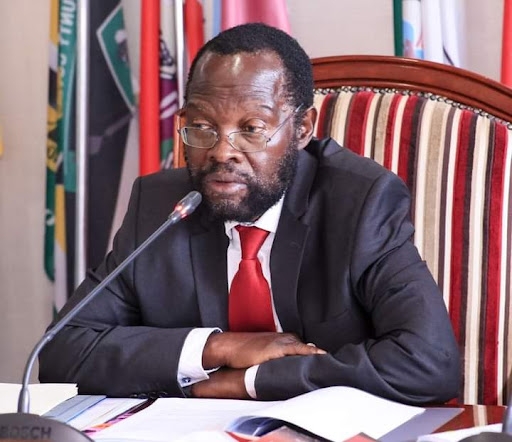Amina Mohamed has been moved yet again, for the third time, since President Uhuru Kenyatta first appointed her to the position of Cabinet Secretary.
The President reshuffled his Cabinet on Friday and transferred her to the Sports ministry barely before she could settle as the Education CS. Previously, she served as the Foreign Affairs CS.
As the once high-flying career diplomat heads to the Sports docket, pundits are waiting to see how she will navigate the uncharted waters.
The lawyer-diplomat inherits a ministry previously held by Rashid Echesa who was sacked.
On January 26, 2018, Amina, 57, joined the Education ministry after her predecessor Fred Matiang'i, now Interior CS, had launched the new 2-6-3-3-3 syllabus.
Matiang'i had also unveiled new textbooks that had multiple errors, which stakeholders said mislead students.
“We have now officially commenced the rollout of the curriculum as envisaged in our plan. I thank all these colleagues for their commitment and their focus to ensure we strengthen the quality of the education of our children, that we prepare and produce manpower that will be globally competitive, ”
Matiang'i told the National Steering Committee in January 2018.
However, late last year Amina shocked the nation when she announced the ministry was not ready for the rollout of the new curriculum.
“The new curriculum pilot will continue for another year, postponing the rollout for one more year to allow for alignment in the education sector and kick off in January 2020,” she said on December 5.
The President was forced to apologise
following the confusion.
"Na
ndio
maana
kwa
niaba
ya
serikali
yangu
naomba
msamaha. Nasema
poleni
sana
kwa
hio
confusion
ambayo
imekuweko
lakini
nawahakikishia
ya
kwamba
tutarekebisha
hio. [On behalf of my government, I ask for forgiveness. I'm very sorry for the confusion, but I assure you we will rectify it]," Uhuru said.
The President was
responding to questions from journalists during a round table at the State House in Mombasa last December.
Amina went further to dismiss public servants sitting on independent councils, boards of public universities and state corporations.
Read:
Also read:
Related: 74
Last month she controversially suggested that the police would be hired to help the Higher Education Loans Board track down and arrest 74,000 former students who were yet to repay their loans.
“We will partner with the agencies to trace the defaulters. We want them to become reliable and responsible citizens by repaying their debts,” Amina said.
Last week, the Teachers Service Commission withdrew Amina's decision to lower the entry requirement for P1 teacher training colleges to D+.
“The authority set up (by Amina) had no mandate to decide the entry grades for those joining teaching.
Lowering of minimum entry standards for teachers is a serious affront to national development and may be a recipe for failed future economy,” the TSC said.
When she was first appointed as the Foreign Affairs CS on 23 April 2013, Amina was among the first 18 cabinet secretaries nominees in Uhuru's administration.
At the time, both Uhuru and Deputy President William Ruto were facing charges at the ICC. Amina was heavily involved behind the scenes shuttle diplomacy that mobilised African leaders to stand with Uhuru and Ruto against the ICC.
“We created the court, it did not create Kenya… we will not accept to be dictated to without being heard,” she told reporters in New York on September 21, 2016.
In January 2017, Uhuru and Ruto launched a diplomatic push to have Amina succeed South Africa’s Nkosazana Dlamini Zuma as the chairperson of the African Union Commission.
Ruto
led
the first delegation in a chartered flight across Africa to lobby for her in
Chad, the DRC, Nigeria, Algeria
and
Liberia. Other trips included Ghana, the Cote d'Ivoire, Mali, Sierra Leone and Gabon, among others.
The second team pushing for Amina’s election at the helm of AU was a separate seven-man Cabinet sub-committee headed by Matiang’i. Members included Najib Balala (Tourism), Sicily Kariuki (Health), Judy Wakhungu (former Environment CS), Henry Rotich (National Treasury), Adan Mohammed (EAC CS) and Raychelle Omamo (Defence).
Pundits argued that the top leadership's push to have Amina at the helm of AU was Uhuru's way of saying thank you to her and the desire to influence Africa's policy.
But Amina failed to clinch the seat that went to Chad’s Moussa Mahamat who garnered 38 votes against the CS's 26 votes.
Following the disputed 2017 presidential election, Amina was deployed to win global support and acceptance for Uhuru after the opposition rejected the results.
She secured visits for top government officials to foreign capitals in the weeks after the polls.










